Anancastic personality disorder is a disorder of the human psyche. A person susceptible to this illness is characterized by a desire for perfectionism, he is obsessed with doubts and drowns in details, he needs ideal results of work, and therefore he is stubborn and irritable. Periodic obsessive thoughts (obsessions) and actions (compulsions) cause deep negative experiences in such people that are difficult for a person to cope with.
This disorder is most common among men, it is genetic in nature, and one of the reasons for its occurrence is an overly harsh upbringing. Parents, be gentle with your children, so as not to reproach yourself later for the shattered psyche of your loved one.
Symptoms
Anankast personality is not difficult to recognize. Don't remain indifferent. If you see that a loved one is tormented by incessant unnecessary doubts, he constantly double-checks everything, shows excessive caution, and in the process of activity is overly concerned with details to the detriment of the process itself, then it’s time to sound the alarm. Such a person is also hampered by a clear directive: either do something perfectly, or do nothing at all. This stops his life. A person becomes overly obligatory, fixated on his activities to the detriment of the rest of his life.
As a result, an over-pedantic person is afraid to violate social norms and orders and suffers from the fact that he cannot adapt to changing circumstances.
When should you suspect a disorder?
To suspect anancastic personality disorder, you should pay attention to the following symptoms:
- constant, unnecessary doubts and double-checks, excessive caution;
- excessive preoccupation with details: rules, schedule, organization, subordination, which sometimes harms the process itself;
- a clear focus only on the “ideal” result of the activity or “nothing at all”, perfectionism, which significantly inhibits the mentioned activity;
- over-obligation and over-conscientiousness, which fixates a person on the activity being performed to the detriment of his personal life;
- thoroughness, strict adherence to social norms and orders;
- inability to adapt to a changed situation, stubbornness, panicky reluctance to change the planned plan;
- the requirement to do everything “just like him”, an inexplicable inability to cede part of the work to other people.
The last point is worth considering in a little more detail. The fact is that the anankast is absolutely convinced that he is the only one who performs some type of activity the way it needs to be performed. And it doesn’t matter what it is: drawing up an important financial report or hanging the keys to offices on the nails of the duty officer at the entrance.
Minuses
Anankast is characterized by an inability to adapt to environmental conditions - rigidity, as well as stubbornness, excessive love of order, laws and rules. This person is obsessed with neatness, goes into the smallest details and sometimes completely insignificant details; he can be called a perfectionist. And all this prevents him from normally completing any of the tasks he undertakes. And they are very afraid of making a mistake, because of this they are indecisive. A person is constantly overcome by “mental chewing gum”: a lot of thinking, but there is no solution to the problem.
Such people are characterized by a high degree of formality, lack of a sense of humor, excessive seriousness, and intolerance.
They are incapable of compromise, but most importantly, they demand from those around them complete submission to the rules of the life they have invented for themselves.
For them, anything that can break familiar stereotypes is alarming and unacceptable, and this anxiety is masked by various rituals. Anankasts often develop completely unacceptable desires.
As a consequence of the disease, people develop anxiety-phobic disorders and obsessive-compulsive neuroses. Is it worth saying that you should consult a psychiatrist for treatment?
https://youtu.be/BwXxL5oztjQ
Forecast
In most cases, the prognosis is favorable. Manifestations of anancaste disorder can be eliminated or reduced to an acceptable level within a year from the start of treatment. If its symptoms persist, the disorder becomes chronic, with periods of improvement and deterioration.
Related posts:
- Paranoid schizophrenia Mental disorders are distinguished by a variety of clinical manifestations. Some diseases are temporary...
- Phobias and stress in men All people experience stress, regardless of gender. AND…
- What does drug use lead to? Addiction to drugs leads not only to loss of friends and discord...
- Anorexia is a type of eating disorder. Anorexia is a mental disorder that belongs to a group of disorders...
At work
Watch your boss. If he cannot and does not want to disrupt the algorithm according to which his work proceeds, he has difficulty delegating authority, and demands that everything be strictly done only as he says, you have a possible anankasta in front of you. There are many of them in leadership positions.
At the same time, he is absolutely sure that he is doing everything correctly, this is the only way it should be, there are no more options. He has pens and pencils lined up on his desk, his monitor stands in a strictly certain place without a single speck of dust, and his keyboard lies at a certain angle. The chief anankast will require, for example, that the numbers in the report appear not on the left or in the middle of the column, but strictly on the right. Lack of understanding on the part of colleagues of such subtleties makes the patient with anancastic disorder angry and refuse to work with such “stupid” employees.
How to avoid making a mistake with a diagnosis?
In order to have confidence in the diagnosis, the sick person must meet certain characteristics, which usually appear already at the initial stage of the formation of personal qualities. When anancaste disorder develops, a person becomes stingy. He is constantly concerned about saving a certain amount for an emergency. This could be a natural disaster, catastrophe, or other reason.
In this situation, a person perceives financial well-being not just as money, but as an opportunity for salvation. It is difficult, almost impossible, to convince such a person and force him to make concessions; he desperately defends his opinion, absolutely confident that he is right.
Types
How can people with anancastic personality disorder be classified? Types of deviations occur at different levels. In psychotic and neurotic, at the same time, the personal characteristics characteristic of this type are preserved in everyone. Some groups of doctors divide anancastic personality disorder into compulsive and obsessive types, others do not.
The obsessive-compulsive character is fundamentally based on such protective mechanisms as “isolation of affect,” in which the emotional component of the experience is leveled out by “reactive formation,” when a negative feeling is transformed into a positive one and vice versa. The person is also convinced that he can completely control all processes - these people are overcome by a mania of total control.
Causes of Anankastic Personality Disorder
As with all other personality disorders, until now in the case of anankastic personality it has not been possible to clearly determine what exactly leads to its occurrence to this day.
Biological and environmental factors are generally believed to influence the development of obsessive-compulsive personality. In the case of the first of these, attention is paid primarily to the role of genetic factors - it is noticeable that people in whose families someone has struggled with some kind of personality disorder (be it an animistic personality or some other problem related to this) they also have an increased risk of developing such disorders.
When it comes to environmental factors that may be associated with the emergence of an ancestor personality, here are a number of different situations that each person may encounter in their life. We talk about problems encountered in early childhood (such as excessive parental control, lack of attention from caregivers or excessive demands on a young patient), bullying at school by peers, or traumatic events.
The individuality of a person as an individual - what is it?
Jealousy and... greed?
Anancasts usually occupy leadership positions. They are jealous - they feel betrayed when part of their work is entrusted to a more active and flexible person. And if not, how does it all end? A patient with anancaste disorder takes on all the work on himself, and this leads to emotional and moral exhaustion, since this is an unbearable burden. Greed? Rather, the desire to do everything with dignity, in the best possible way. The best. The problem of a perfectionist. Try to praise such a person - he will look ten years younger, he will be so pleased!
But if the anancast stalls, he gets bogged down in details, misses deadlines, and gets fired. As a result, he suffers even more from the fact that he could not do what he should, eats himself, plunging deeper into the disease, leaving society in the wilds of his personality: a vicious circle results.
Clear signs of the disease
In his youth, the future anankast is shy and always overly controls himself. To accurately make such a diagnosis, you need to identify four or more of the following signs that appear as a person matures.
- Excessive attention to details and rules, strict adherence to the plan, often to the detriment of the result and meaning.
- Perfectionism leads to relationship problems.
- Excessive immersion in work at the expense of leisure, even when there is no obvious lack of finances.
- Excessive desire to accumulate money, condemnation of unnecessary spending. Every penny seems wasted.
- Such people do not know how to cooperate with others.
- Inflexibility in all areas.
- Discomfort when changing the familiar environment, any repairs and rearrangements are painful for anankast; he has difficulty parting with old things.
- Emotions are under strict control and often do not appear.
- It is difficult to make contact with new people.
Causes
Anancastic personality disorder can be transmitted at the genetic level. The predisposition to it is, according to scientists, about 7%. If the child has had birth and traumatic brain injury, these are also risk factors.
Look back and analyze your childhood. Did your parents forbid you to show your emotions and weaknesses, taught you to be restrained? Emotions are not subject to the control of the mind. A person who suppresses them subsequently experiences guilt for expressing his feelings and desires, and any restraint threatens the possible development of mental illness.
When parents demand that their children meet high behavioral standards and “feeling standards,” the child becomes guilty because the need to control his emotions is imposed on him, but in reality the course of emotional processes is determined by internal reasons. Symptoms of anancastic personality disorder include remorse due to out-of-control emotions and feelings. As children, we do not know how to control our emotions, we are punished for this, and over time we learn and get used to hiding our sincere desires deep inside ourselves. Suppressed emotions lead to mental disorders.
Another mistake parents make is expecting their children to exhibit exceptional behavioral and academic success. Didn't live up to expectations? This is followed by punishment. And as a result - constant self-doubt, with a tendency to increase.
The danger of anancastic personality disorder also lies in the fact that it can become one of the signs of schizophrenia and autism, manic-depressive psychosis, organic brain damage, and develop against the background of the appearance of tumors.
From the point of view of psychoanalysis, anancasts thus show repressed aggression or anxiety.
Diagnostics
If we talk about making a diagnosis, this should be done only after appropriate observations of a person’s behavior over a certain period of time. It is advisable to make a diagnosis when a person reaches adulthood, since character traits characteristic of young people in adolescence should also be taken into account.
To make an accurate diagnosis, the following important aspects must be taken into account:
- Manifestations of the disorder must be total and independent of circumstances.
- Stability of symptoms that were observed in adolescence and continue to be present in older age.
- Excessive tendency to doubt, which cannot be confused with a person’s everyday doubts in connection with life circumstances.
- Unreasonable occurrence of persistent thoughts that do not change over time.
- The presence of perfectionism, which prevents the person from achieving the goals and objectives set for him.
Personality type
Many psychologists identify a special, anancastic personality type, not considering this disorder a disorder, but simply considering it to be a person’s characteristics. But there are psychological schools that consider such behavior and reactions to be deviations from the norm. In any case, if you find similar symptoms in yourself or your loved ones, consult a psychiatrist or first a psychologist.
Both points of view are unanimous in one thing: if a low level of manifestation simply causes increased nervousness of a person and can manifest itself in the form of accentuation (at a neurotic level), then a more aggravated severity leads to deep problems of socialization and is called anancastic psychopathy. Consultations with specialists will not be superfluous in any of the cases; discomfort must be resolved.
Establishing diagnosis
The diagnosis is made based on the analysis of the following psychopathological symptoms:
- constant doubts and anxiety;
- pathological perfectionism;
- painful pedantry;
- excessive detail;
- stubbornness;
- requiring others to comply with its rules;
- suppression of one's own desires for the sake of one's own rules.
It is believed that if a person has at least three of the listed signs, then such a person is anankast.
Treatment of the disease
Anancastic personality disorder must necessarily be subject to comprehensive treatment. During therapy, it is worth paying increased attention to the patient’s desire to actively control emotional manifestations. Methods of therapy:
- Immerse yourself in creativity by allowing the patient to express his experiences, for example, in form and color.
- Group classes give excellent results, but at the stage of psychopathy they are not always possible.
- To eliminate vegetative manifestations (increased sweating and blood pressure, increased heart rate), additional consultations with cardiologists, neurologists, prescription of psychotropic drugs and other drugs are necessary. Competent and timely treatment of anancastic personality disorder will help return a full-fledged healthy person to society.
Possible complications and consequences
The main consequence of anancastic personality disorder is a significant change and (or) deviation from generally accepted behavioral norms and trends accepted in a specific social environment, accompanied by personal and social disintegration.
Anancastic personality disorder often accompanies mental illnesses such as autism, manic-depressive psychosis, and schizophrenia.
In this case, there is the formation of certain disturbances in the actions, thinking and perceptions of others, which leads to a deterioration in the quality of life of the patient and his immediate environment.
Prevention of anancastic personality disorder
- Prevention of traumatic influences
- Proper child rearing
- Changing patients' attitudes towards traumatic situations using persuasion, self-hypnosis, suggestion.









